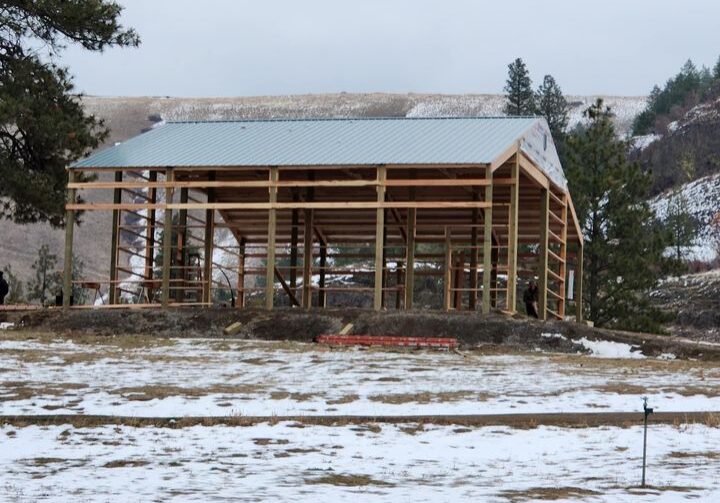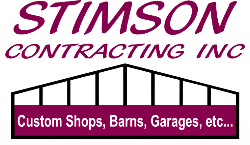
Common Mistakes to Avoid with Pole Building Projects
At Stimson Contracting, we’ve been designing and building pole structures for years—everything from barns and garages to custom homes and workshops. Over that time, we’ve encountered just about every mistake a property owner can make when it comes to pole building projects. While the pole building method is incredibly flexible, cost-effective, and durable, there are still common pitfalls that can turn your dream project into a headache.
In this article, I’ll walk you through some of the most common mistakes we see and provide tips on how to avoid them—so your pole building project can go smoothly from start to finish.
Table of Contents
1. Neglecting Site Preparation
One of the most common mistakes we see is neglecting the site prep. It’s tempting to jump right into construction, but without proper grading, clearing, and preparation, your building could face issues down the line—like poor drainage, uneven settling, or unstable foundations.
Proper site preparation includes:
Clearing vegetation, debris, and rocks
Ensuring proper slope for drainage
Establishing a stable foundation to prevent shifting
Don’t skimp on this step—it’s crucial for the long-term stability of your pole building.
2. Underestimating the Importance of Proper Insulation
Pole buildings are often chosen for their cost-efficiency and functionality, but many owners overlook one key factor: insulation. Without proper insulation, your building can become too hot in the summer, too cold in the winter, and prone to moisture issues.
We recommend:
Spray foam insulation for maximum thermal resistance and air sealing
Batt insulation or blown-in cellulose for lower-cost alternatives
Installing vapor barriers to reduce moisture problems
Proper insulation isn’t just about comfort; it’s about protecting your building and ensuring it’s energy-efficient in the long run.
3. Choosing the Wrong Materials
Choosing the right materials for your pole building is crucial for its durability, energy efficiency, and aesthetic appeal. Don’t simply go with the cheapest option—opt for high-quality materials that will stand the test of time, especially in harsh weather conditions.
Consider:
Pressure-treated lumber for the posts to prevent rot and termites
Galvanized steel or metal roofing for durability
High-quality insulation and energy-efficient windows and doors
By investing in the right materials upfront, you’ll save on maintenance and repairs later.
4. Failing to Plan for Future Expansion
When planning your pole building, it’s easy to get caught up in the immediate needs—but if you fail to plan for the future, you may regret it later. For example, if your business or personal needs grow, you’ll want to be able to expand the structure easily.
Think about:
How much space you’ll need in 5-10 years
The possibility of adding additional bays, storage, or living space
Including expandable features like extra doorways, wall space, and ceiling height
Planning for future expansion can save you from costly and disruptive remodels down the road.
5. Ignoring Local Building Codes and Permits
It may seem like a time-saver to skip over permits or ignore local building codes, but this mistake can cost you big time. Without the proper documentation and compliance, you risk fines, delays, and even having to tear down or rebuild your structure.
Always make sure to:
Check with your local building department to understand permit requirements
Ensure your plans comply with zoning regulations
Work with a contractor who is familiar with local codes
Getting your permits and approvals in place before starting construction ensures your project stays on track and meets all necessary safety and legal standards.
6. Overlooking Drainage and Foundation
A strong foundation and proper drainage are the backbone of your pole building. Without them, you may face issues like:
Water pooling around the foundation
Soil erosion under the posts
Premature foundation failure
Make sure to:
Work with an engineer to determine the best foundation for your land
Consider drainage solutions like French drains, gravel beds, or sloped grading
Plan for moisture barriers and sealing
A well-prepared foundation ensures your building is stable, durable, and free from water damage.
7. Underestimating the Budget
It’s easy to underestimate the costs of a pole building project. Many property owners get into trouble by starting with a low-ball estimate that doesn’t cover all the essential components—like permits, utilities, or interior finishes.
Make sure to:
Account for the full scope of the project, including site prep, materials, and labor
Set aside a contingency fund for unexpected costs
Work with an experienced contractor who can provide a realistic quote
A well-planned budget gives you the peace of mind that your project will come in on time and on budget.
8. Not Considering the Long-Term Functionality
When designing your pole building, functionality is key. It’s easy to focus on aesthetics or immediate needs, but you also need to think about the building’s use over time.
Ask yourself:
Will this layout work for me long-term?
Will it meet my storage, workspace, or business needs as they evolve?
How will the structure handle wear and tear from heavy use?
The design should cater to both current and future needs—this ensures the building remains functional for years to come.
9. Skimping on Quality Contractors
When it comes to pole building projects, working with a qualified, experienced contractor is critical. Cutting corners by hiring the cheapest, least qualified crew can lead to poor craftsmanship, delays, and unnecessary repairs down the road.
Choose a contractor who:
Has a proven track record with pole building projects
Offers transparent pricing and timelines
Communicates clearly and efficiently
At Stimson Contracting, we pride ourselves on delivering top-notch quality, clear communication, and a smooth construction process from start to finish.
10. Conclusion: Building Your Pole Structure the Right Way
Building a pole structure is an exciting project, but it requires careful planning and attention to detail to avoid common mistakes. By avoiding these pitfalls—like neglecting site prep, overlooking insulation, and cutting corners on materials—you can ensure your project is a success. At Stimson Contracting, we’re here to help you avoid these mistakes and create a pole building that’s durable, efficient, and built to last for years to come.
If you’re ready to start your pole building project, contact us today to schedule a consultation and begin designing a structure that perfectly fits your needs.
📞 Call today to schedule a free site consultation 509.244.2636
🌐 Visit our website for Spokane-specific building tips
📧 Request a custom quote and timeline
Read our other articles:
- Home Page
Barndominiums in Spokane: Trendy, Durable, and Affordable
10 Reasons Pole Buildings Are the Future of Rural Construction
How to Choose the Right Pole Barn Contractor
Top Pole Barn Design Ideas for 2025
How to Plan Your Dream Shop Construction Project
What You Need to Know Before Building a Pole Barn in Spokane
The Pros and Cons of Living in a Barndominium
Spokane Shop Construction: Local Regulations to Know
Custom Pole Buildings: Options That Add Value
From Barn to Barndo: The Transformation Process
Spokane’s Growing Demand for Custom Commercial Buildings
Common Mistakes to Avoid with Pole Building Projects
Is a Pole Building Right for Your Small Business?
Why Pole Barns Are Ideal for Rural Spokane Properties
Can a Pole Barn Increase Your Property Value in Spokane?
Multi-Use Shop Buildings: Storage, Work, and More
7 Creative Uses for Pole Barns in Spokane
Exploring the Cost Per Square Foot of Pole Barns
10 Barndominium Myths Debunked
Building a Shop on a Budget Without Cutting Corners
Navigating Commercial Building Codes in Spokane
Turning a Pole Barn into a Livable Space
The Complete Guide to Pole Building Construction in Spokane
What Is a Barndominium and Why Should You Build One?
Shop Construction Mistakes to Avoid
Cost Breakdown: Building a Barndominium in 2025
Post-Frame vs. Pole Barn: What’s the Difference?
Spokane Area Shop Construction: Timeline Expectations
What Makes a Barndominium So Cost-Effective?
Top 5 Mistakes to Avoid When Building a Pole Barn
Tips for Constructing a Durable Warehouse
How to Insulate Your Pole Barn for All-Season Use
Is a Barndominium Right for Your Family?
How Long Do Pole Buildings Last? Lifespan and Maintenance
How to Make Your Shop Energy Efficient
Upgrading Your Existing Pole Building
Barndominium Floor Plans That Maximize Space and Style
Adding Insulation to Pole Buildings: Pros and Cons
Durable Flooring Options for Shop Spaces
How to Prepare Your Spokane Property for Pole Barn Construction
The Evolution of Pole Barn Design: Modern Features to Consider
How to Design a Multi-Use Pole Barn That Works for You
Luxury Barndominiums: Yes, It’s a Thing
How to Prepare a Commercial Lot for Building
Must-Have Add-Ons for Your Pole Barn Project
Barndo vs Tiny Home: Which One Fits Your Lifestyle?
Modern Office Construction: Open Space vs. Private
How to Select the Right Commercial Builder
Building a Custom Barndominium: What to Expect
Energy-Efficient Pole Buildings: Is It Possible?
Storage Solutions Inside Your Workshop
Tips for Adding Electrical and Plumbing to Your Shop
How to Incorporate Rustic Charm into Your Barndo
Mixed-Use Commercial Buildings: What to Know
How Weather Affects Pole Barn Construction in the Northwest
How to Add a Workshop to Your Barndominium
Spokane Zoning Regulations for Barndominiums
Spokane Businesses Love These Commercial Floor Plans
Shop Buildings for Hobbyists: What to Include
Spokane Horse Barn Builders
Spokane Indoor Arena Builders
Spokane Agricultural Farm Buildings
Spokane Airplane Hangar Builders
Spokane Commercial Building Builder
Pole Building Contractors in Airway Heights, WA
Pole Building Contractors in Medical Lake, WA
